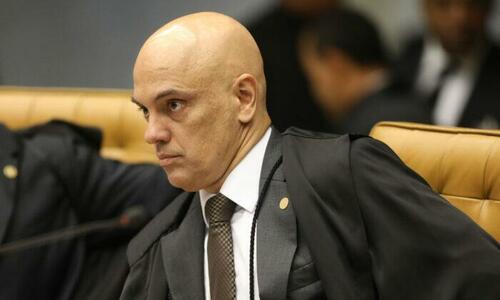Brazil’s Democracy Under Threat: Supreme Court Blocks President’s Social Media
Authored by Augusto Zimmermann via The Epoch Times,
In Brazil, some judges have highly ambitious political goals and make decisions accordingly.
The current presiding justice at the nation’s Supreme Electoral Court is Alexandre de Moraes. He was elected as the presiding electoral officer in August, in a public ceremony with 2,000 guests at the court auditorium. He was a member of the Brazilian Social Democratic Party before being nominated justice of the nation’s Federal Supreme Court on Feb. 22, 2017.
Before being nominated to the nation’s highest court, as reported by the French daily Le Monde, he was at the centre of a controversy when the daily Estadão published an investigation showing that he had intervened as a lawyer in at least 123 legal cases to defend a corporation that some have argued is suspected of being linked to Brazil’s main drug trafficking group, the First Command of the Capital.
Moraes, who is now the nation’s top electoral officer in Brazil and responsible for overseeing the presidential elections, has issued numerous “monocratic decisions” against “misinformation,” in addition to sending some of President Jair Bolsonaro’s friends and supporters to jail, confiscating their electronic devices, and freezing their bank accounts.
On March 18, for example, Moraes ordered the nationwide suspension of the messaging app Telegram. The ruling came after Telegram ignored an earlier order to block the account of Allan dos Santos, a supporter of Bolsonaro accused of spreading “misinformation.” He had previously issued a warrant for the arrest of Santos in October.
In his ruling suspending Telegram nationwide, Moraes mentions its failing to remove “misleading” content from Bolsonaro’s own Telegram page. As reported, not only did he order the shutdown of the message app nationwide but also ordered Apple and Google to introduce “technological obstacles” to block Telegram on their operating systems and withdraw it from their digital stores in Brazil.
Bolsonaro, who seeks reelection in October, relies on Telegram to reach his voter base. He has more than a million followers on the platform and this could prove crucial to his electoral campaign.
Brazilian Supreme Court judge Alexandre de Moraes is pictured during a session to rule on whether former president Luiz Inacio Lula da Silva should start a 12 year prison sentence for corruption, potentially upending this year’s presidential election, at the Supreme Court in Brasilia, Brazil, on April 4, 2018. (Victoria Silva/AFP via Getty Images)
‘Authoritarian Decisions’
On March 19, during the popular television program “Os Pingos nos Is” from Jovem Pam, journalist Augusto Nunes accused Moraes of committing several illegalities, including the abuse of authority and the violation of a cláusula pétrea (“stone clause”) in the Brazilian Constitution that makes freedom of expression an inalienable right of the citizen.
Nunes also criticized the silence of politicians about Moraes’s “decisions,” including the banning of Telegram nationwide.
“It’s time to demand senators and judges handcuffed for their cowardice. And those appointed by President Jair Bolsonaro have to explain how long this cowardly silence they have maintained in the face of arrogance will last,” he said.
On May 27, 2020, Justice Moraes, who had become the nation’s top electoral officer, ordered the federal police to launch an operation probing businessmen, bloggers, and politicians allied to Bolsonaro. In the decision that authorised the operation, he also determined the blocking of all their accounts on social media outlets such as Facebook, Twitter, and Instagram. According to him, the monocratic decision is necessary for the interruption of “misinformation” and “fake news.”
The investigation on “misinformation” conducted by Moraes concerns more generally the dissemination of information regarding the transparency of electronic voting machines and the credibility of the Brazilian electoral commission, which is actually headed by Moraes himself.
Filipe Martins, the special advisor to the presidency of the Republic for international affairs, commented that “journalists, humorists, and ordinary citizens who act spontaneously are being treated as bandits for daring to express opinions that displease the establishment.”
…
Bolsonaro says democracy is now under serious attack in the country. He has accused these unelected judges of practising political interference and trying to deploy a judicial dictatorship.
“Brazil is on the road to dictatorship. This is how dictatorships start now. You lose your freedom little by little, then one day you look, and you are completely tied up,” he told network Jovem Pan.
After knowing all these extraordinary things, who would disagree? The democratic system is clearly being undermined by the replacement of the rule of law with the rule of judges. In fact, the premise that unelected judges know better what is best for the nation is elitist and utterly undemocratic.
It is ironic to see that now the major threat to democracy in Brazil now comes not from elected politicians but from a highly anachronistic judicial oligarchy.
Tyler Durden
Mon, 09/05/2022 – 21:30

